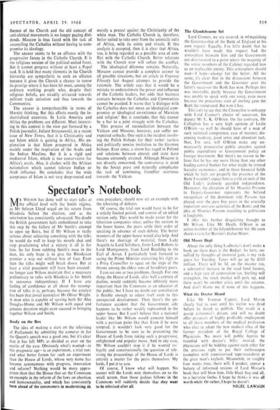Boofy on the Box The idea of making a start
on the televising of Parliament by admitting the cameras in for the Queen's speech was a good one, but it's clear that it has left MPs as divided as ever on the merits of the case. Obviously what's wanted—in this pragmatic age—is an experiment, a trial run; and what better forum for such an experiment than the House of Lords, whose very name has become synonymous with progress, innovation and reform? Nothing would be more appro- priate than that the House that set the Commons an example in the reform of the laws on abortion and homosexuality, and which has consistently been ahead of the commoners in modernising its own procedure, should now set an example with the televising of debates.
Of course, the trial run would have to be for a strictly limited period, and consist of an edited version only. This would be made easier for the television companies since, unlike the custom in the lower house, the peers settle their order of speaking in advance of each debate. The better manners of the upper house would also help. And there's no shortage of material, from Lady Asquith to Lord Salisbury, from Lord Robens to Lord Montgomery, from Lord Beeching to the Earl of Arran. I particularly look forward to seeing the Prime Minister exercising his right as a Privy Councillor to squat on the steps of the throne among the eldest sons of hereditary peers.
I can see one or two problems, though. For one thing, the House of Lords, after half a century of decline, would suddenly become infinitely more important than the Commons as an educator of the public; but I have no doubt our constitution is flexible enough to adjust itself even to this unexpected development. Then there's the un- fortunate accident that the Government side happens to be rather weakly represented in the upper house. But I can't believe that a national leader like Mr Wilson would concern himself with a partisan point like that. Even if he were tempted, it wouldn't look very good for the Government to be seen to be preventing the House of Lords from taking such a progressive, enlightened and popular move. And in any case, Mr Wilson couldn't stop it if he wanted to: legally and constitutionally the question of tele- vising the proceedings of the House of Lords is entirely a matter for the peers themselves. My lords, I put it-to you.
Of course, I know what will happen. No sooner will the Lords vote themselves on to the small screen, than those jealous fellows' in the Commons will suddenly decide that they want to be televised after all.










































 Previous page
Previous page